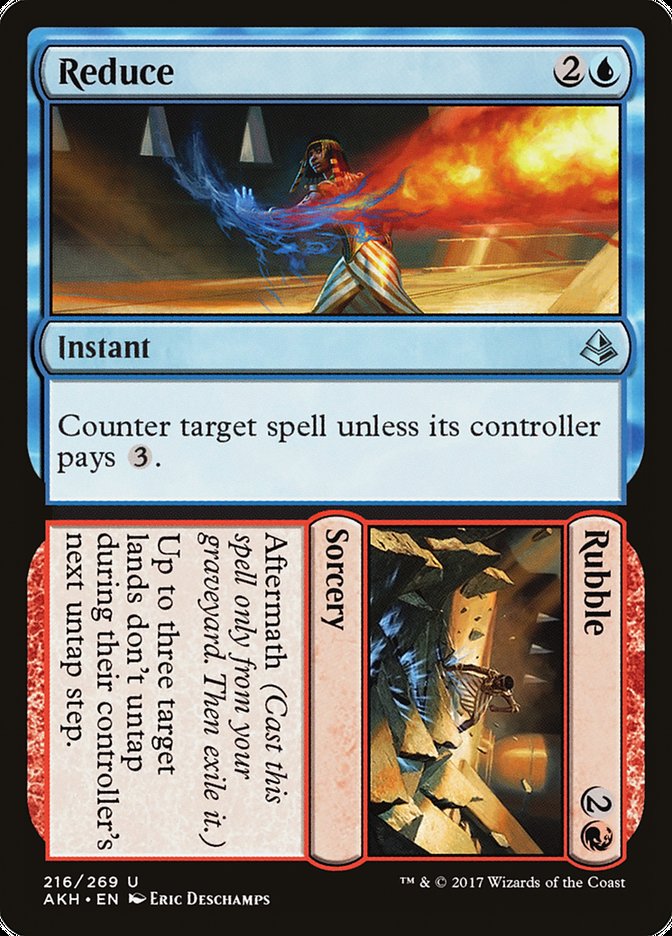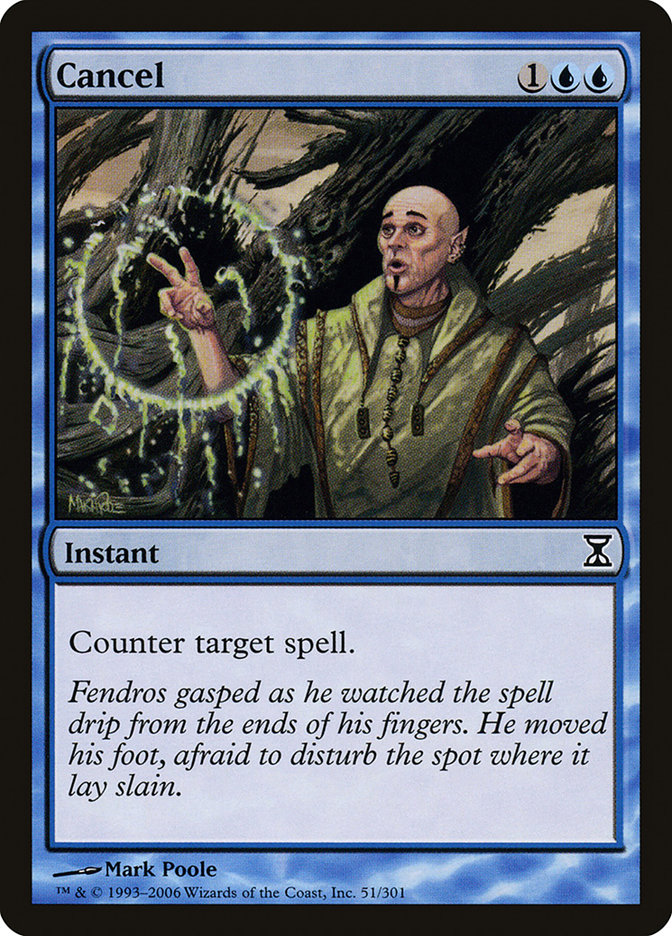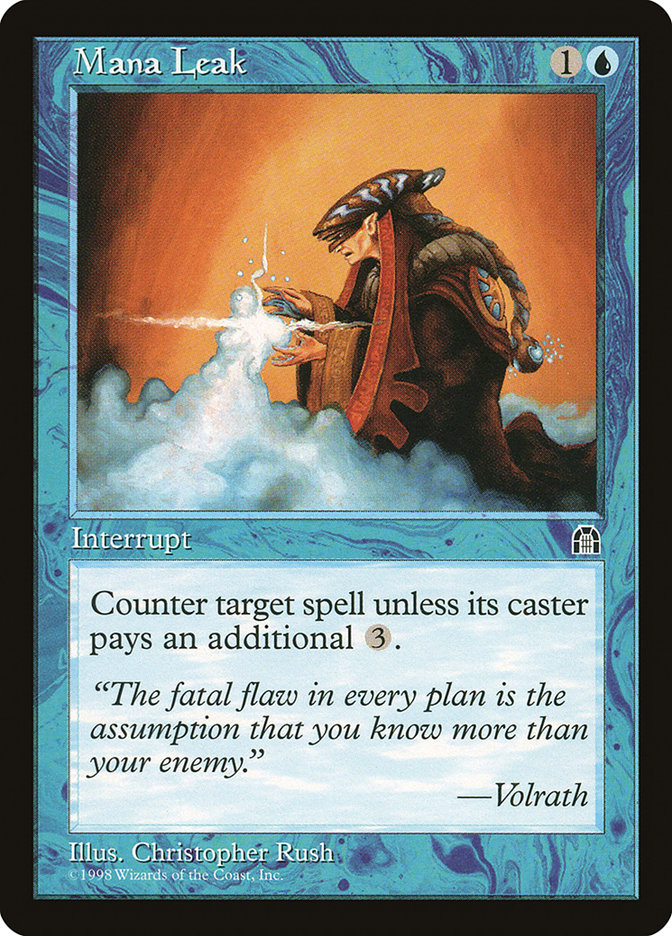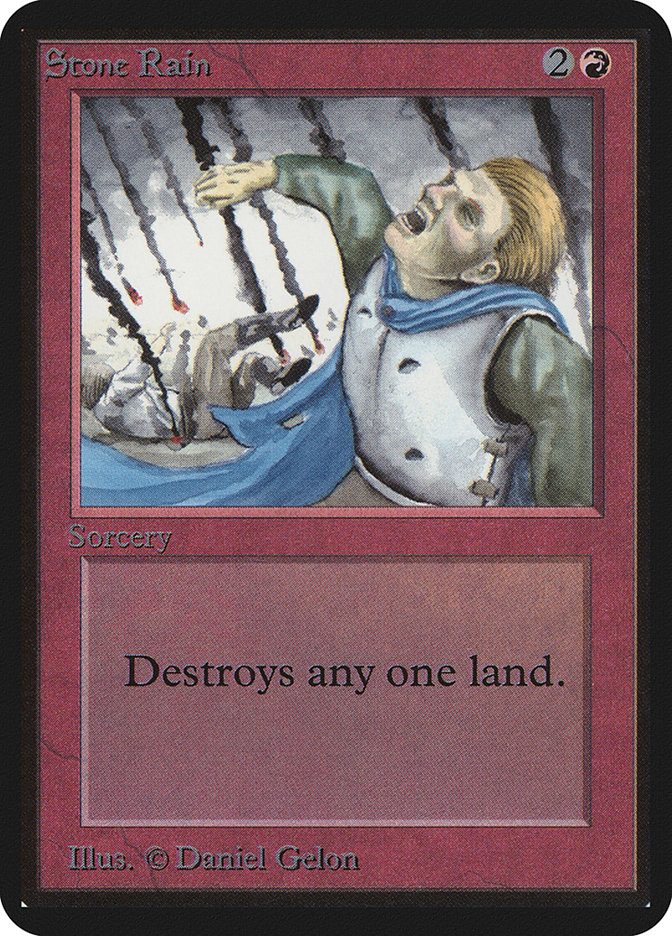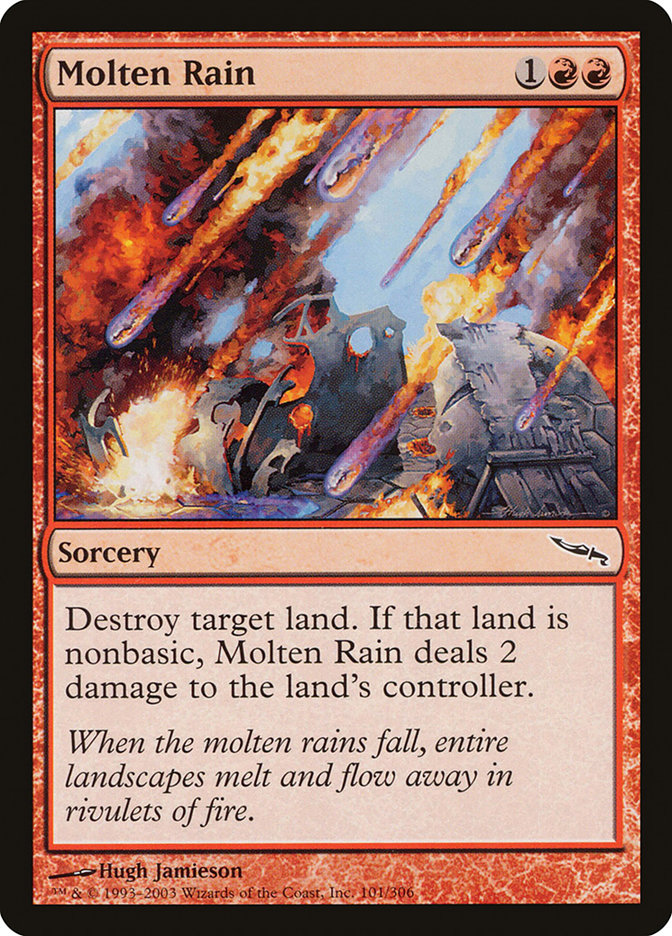Reduce // Rubble MTG Card
| Card sets | Released in 3 setsSee all |
| Mana cost | |
| Converted mana cost | 6 |
| Rarity | Uncommon |
| Type | Sorcery |
| Abilities | Aftermath |
Text of card
Aftermath (Cast this spell only from your graveyard. Then exile it.) Up to three target lands don't untap during their controller's next untap step.
Cards like Reduce // Rubble
Reduce // Rubble is an intriguing card with a dual nature in MTG. It belongs to the split card category, which offers players a choice between two different effects. Reduce, the first part of the card, is a countering spell akin to the likes of Cancel or Mana Leak, but with a different mana cost and the added benefit of targeting only spells with converted mana cost four or greater.
On the flip side, we have Rubble, which stands in contrast by disrupting an opponent’s land resources, much like a Stone Rain effect with a variation that affects untapped lands and draws a card. Unlike Stone Rain, Rubble can only target nonbasic lands but provides the advantage of a card draw. It shares similarities with another card, Molten Rain, which also deals with nonbasic lands but adds direct damage to the mix.
When comparing Reduce // Rubble to other control and land destruction spells in MTG, the duality it presents can be a strategic advantage. Players are given the flexibility to adapt to different game states, whether it’s stopping a key spell or delaying an opponent’s development—all in one card slot. This versatility could be a deciding factor in games that require control and precision.
Cards similar to Reduce // Rubble by color, type and mana cost
Card Pros
Card Advantage: Reduce // Rubble offers the versatility of disrupting your opponent’s strategy by sending a spell back to their hand. This sets them back while keeping your hand full.
Resource Acceleration: The Rubble half of the card puts your opponent in a tough spot by making lands unusable for a turn. This can effectively accelerate your position, giving you a time advantage while they recover.
Instant Speed: The instant speed nature of Reduce allows for strategic play, such as surprising an opponent during their turn or at the end of their turn, ensuring your mana doesn’t go to waste.
Card Cons
Discard Requirement: Reduce // Rubble demands players to forfeit another card from their hand to initiate its effect. In critical moments where every card counts, this can put the player at a considerable strategic disadvantage, draining their resources too quickly.
Specific Mana Cost: The casting cost for Rubble includes both red and blue mana, which may not align with the mana base of every deck. Decks without a strict commitment to these colors might find this card less versatile and harder to play efficiently.
Comparatively High Mana Cost: With a mana cost that’s on the higher end for its impact on the game, Reduce // Rubble competes with other spells and abilities that could provide more value or a stronger board presence for the same, or lower, mana investment.
Reasons to Include Reduce // Rubble in Your Collection
Versatility: As a split card, Reduce // Rubble offers the flexibility to disrupt opponents either by countering a spell or by impeding their mana resources, providing options based on the game’s context.
Combo Potential: Rubble can force a reset on an opponent’s land base, which can combo well with land destruction strategies or create openings for your win conditions.
Meta-Relevance: In a format where keeping pace with opponents is key, Reduce // Rubble can be used to hinder combo decks or tempo plays, maintaining its relevance in various metas.
How to beat
Overcoming the strategic complexities that Reduce // Rubble presents in MTG requires a nuanced approach. As a split card, its versatility allows players to either hinder an opponent’s tempo in the early game with Reduce or disrupt their land base later using Rubble. To effectively beat this card, prioritizing your land drops is essential, ensuring you have a diverse array of basic and nonbasic lands to mitigate its land destruction aspect.
Securing countermeasures such as counter-spells or versatile instant-speed removal can help you maintain control. Cards like Negate are particularly useful since they can counter noncreature spells at a low cost, which is perfect against the sorcery speed constraint of both Reduce and Rubble. It’s also wise to apply pressure on your opponent, forcing them to use the card sub-optimally. Lastly, implementing card draw strategies to replenish your hand will dilute the impact of the discard effect. Adaptation and strategic land management thus stand as your allies in turning the tides against Reduce // Rubble.
Where to buy
If you're looking to purchase Reduce // Rubble MTG card by a specific set like Amonkhet and Amonkhet Remastered, there are several reliable options to consider. One of the primary sources is your local game store, where you can often find booster packs, individual cards, and preconstructed decks from current and some past sets. They often offer the added benefit of a community where you can trade with other players.
For a broader inventory, particularly of older sets, online marketplaces like TCGPlayer, Card Kingdom and Card Market offer extensive selections and allow you to search for cards from specific sets. Larger e-commerce platforms like eBay and Amazon also have listings from various sellers, which can be a good place to look for sealed product and rare finds.
Additionally, Magic’s official site often has a store locator and retailer lists for finding Wizards of the Coast licensed products. Remember to check for authenticity and the condition of the cards when purchasing, especially from individual sellers on larger marketplaces.
Below is a list of some store websites where you can buy the Reduce // Rubble and other MTG cards:
 BUY NOW
BUY NOW BurnMana is an official partner of TCGPlayer
- eBay
- Card Kingdom
- Card Market
- Star City Games
- CoolStuffInc
- MTG Mint Card
- Hareruya
- Troll and Toad
- ABU Games
- Card Hoarder Magic Online
- MTGO Traders Magic Online
See MTG Products
Printings
The Reduce // Rubble Magic the Gathering card was released in 3 different sets between 2017-04-28 and 2020-08-13. Illustrated by Eric Deschamps.
| # | Released | Name | Code | Symbol | Number | Frame | Layout | Border | Artist |
|---|---|---|---|---|---|---|---|---|---|
| 1 | 2017-04-28 | Amonkhet | AKH | 216 | 2015 | Aftermath | Black | Eric Deschamps | |
| 2 | 2020-08-13 | Amonkhet Remastered | AKR | 254 | 2015 | Aftermath | Black | Eric Deschamps | |
| 3 | The List | PLST | AKH-216 | 2015 | Aftermath | Black | Eric Deschamps |
Legalities
Magic the Gathering formats where Reduce // Rubble has restrictions
| Format | Legality |
|---|---|
| Historicbrawl | Legal |
| Commander | Legal |
| Historic | Legal |
| Legacy | Legal |
| Modern | Legal |
| Oathbreaker | Legal |
| Vintage | Legal |
| Duel | Legal |
| Explorer | Legal |
| Gladiator | Legal |
| Pioneer | Legal |
| Timeless | Legal |
Rules and information
The reference guide for Magic: The Gathering Reduce // Rubble card rulings provides official rulings, any errata issued, as well as a record of all the functional modifications that have occurred.
| Date | Text |
|---|---|
| 2017-04-18 | A spell with aftermath cast from a graveyard will always be exiled afterward, whether it resolves, it’s countered, or it leaves the stack in some other way. |
| 2017-04-18 | All split cards have two card faces on a single card, and you put a split card onto the stack with only the half you’re casting. The characteristics of the half of the card you didn’t cast are ignored while the spell is on the stack. For example, if an effect prevents you from casting green spells, you can cast Destined of Destined // Lead, but not Lead. |
| 2017-04-18 | Each split card has two names. If an effect instructs you to choose a card name, you may choose one, but not both. |
| 2017-04-18 | Each split card is a single card. For example, if you discard one, you’ve discarded one card, not two. If an effect counts the number of instant and sorcery cards in your graveyard, Destined // Lead counts once, not twice. |
| 2017-04-18 | If another effect allows you to cast a split card with aftermath from a graveyard, you may cast either half. If you cast the half that has aftermath, you’ll exile the card if it would leave the stack. |
| 2017-04-18 | If another effect allows you to cast a split card with aftermath from any zone other than a graveyard, you can’t cast the half with aftermath. |
| 2017-04-18 | If you cast the first half of a split card with aftermath during your turn, you’ll have priority immediately after it resolves. You can cast the half with aftermath from your graveyard before any player can take any other action if it’s legal for you to do so. |
| 2017-04-18 | Split cards with aftermath have a new frame treatment—the half you can cast from your hand is oriented the same as other cards you’d cast from your hand, while the half you can cast from your graveyard is a traditional split card half. This frame treatment is for your convenience and has no rules significance. |
| 2017-04-18 | While not on the stack, the characteristics of a split card are the combination of its two halves. For example, Destined // Lead is a green and black card, it is both an instant card and a sorcery card, and its converted mana cost is 6. This means that if an effect allows you to cast a card with converted mana cost 2 from your hand, you can’t cast Destined. This is a change from the previous rules for split cards. |
| 2017-07-14 | Once you’ve started to cast a spell with aftermath from your graveyard, the card is immediately moved to the stack. Opponents can’t try to stop the ability by exiling the card with an effect such as that of Crook of Condemnation. |
